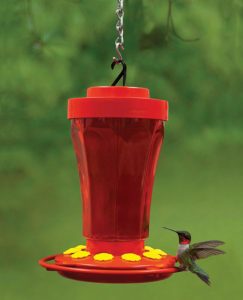 We have one hummingbird feeder in our back yard. It is located just below eye level, twelve feet from where we sit together in the morning to have our coffee. The aerial conflict we watch among the high speed birds is fascinating. Usually there is one bird who is the guard of the goods. That one bird stays busy fending off the others to keep them from having a sip of the red nectar. Not only do none of the other birds get any, but the guard itself goes without. It seems that it would be so simple for all of them to each perch peacefully at one of the ten ports of the feeder and serenely sip away until full, and blissfully jet on their way. But much of the time it does not work that way at this feeder. Even though there is abundance for all, one bird has to try to protect the goods so much that they themselves miss getting it. At least that is the way it appears. I am not sure how the hummingbird brain works, but it sure seems like there is a lot of energy spent fighting unnecessarily. As long as two humans can fog a mirror, there will be conflicts.
We have one hummingbird feeder in our back yard. It is located just below eye level, twelve feet from where we sit together in the morning to have our coffee. The aerial conflict we watch among the high speed birds is fascinating. Usually there is one bird who is the guard of the goods. That one bird stays busy fending off the others to keep them from having a sip of the red nectar. Not only do none of the other birds get any, but the guard itself goes without. It seems that it would be so simple for all of them to each perch peacefully at one of the ten ports of the feeder and serenely sip away until full, and blissfully jet on their way. But much of the time it does not work that way at this feeder. Even though there is abundance for all, one bird has to try to protect the goods so much that they themselves miss getting it. At least that is the way it appears. I am not sure how the hummingbird brain works, but it sure seems like there is a lot of energy spent fighting unnecessarily. As long as two humans can fog a mirror, there will be conflicts.
Two issues that we all need to face in conflict is number one, what is the real cause of the conflict, and number two, how are we going to handle the conflict. If we are going to be like the guard bird, we are going to protect “our goods.” Those “goods” can consist of our personal value and self-esteem. Then, there are our “rights”. We don’t like for people to tread on our “rights.” Protecting these could be causes of conflict. How we handle it is either we spend a lot of energy chasing the aggressors off, or, we can know and trust that the Heavenly Father will always supply enough for all to be filled. Then we can calmly fill up on his goodness while others around us also partake of his provisions. Any conflict stemming from us guarding our goods or our rights, could indicate a lack of trust that God will vindicate and take care of us by his love and goodness. We are not to be doormats that people tread under foot, but there is a place of rest and trust in God’s goodness that will give an inward peace even though there might be an outward commotion. When God says he will take care of us, he is good for his word. Jesus took a beating and shed his blood and died so that we could be taken care of in body and in spirit, healed and given eternal life. If he has every hair numbered and he cares enough to feed the sparrows, and the hummingbirds, you can know that he cares for you, to take care of who you are. Accepted in the beloved, you can trust and rest in him (Ephesians 1:6).